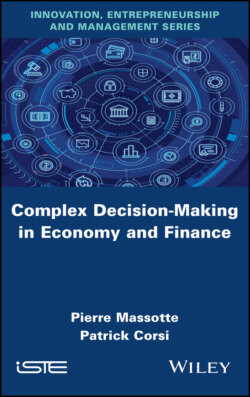Читать книгу Complex Decision-Making in Economy and Finance - Pierre Massotte - Страница 17
I.4.3. The role of public institutions
ОглавлениеThis section defines a new role and mission for public institutions and administrations.
Since the Industrial Revolution, institutions and administrations have been abused by technology and much more recently by the mass liberation of consumer power. It is important that they regain their true mission, probably to preserve the integrity of all kinds of networks. Indeed, network law, “netiquette” and exchange protocols are all focal points for 21st Century administrations. Until the last century, an administration was mainly concerned with activities related to the passage of human action: the law of blood (transmission of inheritances, etc.), soil (management of borders and space at the level of individuals, commercial goods, etc.) and time (administrative cycles, etc.). Now, it must restructure itself to integrate the advances and challenges facing our information society. These new focal points are left relatively vacant, only to see the private use that is sometimes made of models and practices of general interest. For example, a company filing a patent for a general business model, a type of technology transfer, a good practice, all elements of the knowledge society that would probably benefit from being infiltrated into the public domain in order to promote the emergence of scaling, thus freeing and multiplying the economic value of the whole. It can be seen that these elements of change and evolution are only slightly influenced by political changes in power.
This makes it possible to reposition the role of the administration: it must be the dynamic link between the individual and society, a society where the individual can experience his or her spontaneous and dynamic relationship with other individuals. This relationship is here called participation given that the consumer perceives an increased level of participation as an overall value. From the individual’s point of view, power is in sharing, following the famous slogan of Ed Feigenbaum (Professor at Stanford University and founder of Teknowledge in the early 1980s) “Knowledge is Power”. The role of an administration is to prepare and make possible the entire economy. Yet, such orientation, which we have sometimes called the “business of wholeness”, can suffer from many disruptions (economic and trade withdrawals, customs barriers, preservation of local interests, etc.) which can hinder the availability, dissemination and exploitation of knowledge.
Here again, we are faced with a complex problem, in the sense that it is vital to ensure the effective and efficient functioning of a global societal system. The question is: how can we benefit from the overall technological evolution to solve societal problems? However, advancing science and ensuring economic growth cannot be “driven” and managed only by policy-makers [CAC 05]. Such an evolution must correspond to the needs of end users and be planned by them according to their demand. Indeed, it is individuals who share the vision of the firm’s concrete needs, who sanction the economic value of an innovative project according to the “benefit” they see derive from it, who finance, directly or indirectly, the development of scientific progress and who take the technological and economic risk of research and development. An administration can only play a catalytic role and not an administrator role because the sources of progress cannot be altered! Just think of public R&D program subsidies, for instance.
We do not believe that the 21st Century can, in the long term, be anything other than ecological, in the original sense of the word. This word recognizes interrelation as a dual factor of entities (individuals, objects, etc.) and accrues an expanded value to it. Hence, we considered it useful to pave the way towards an engineering of this “ecology”, through the signs of complexity science engineering. We hope that this book will stimulate the reflection and activate corresponding work. With its importance, this work has also become urgent for our society.
